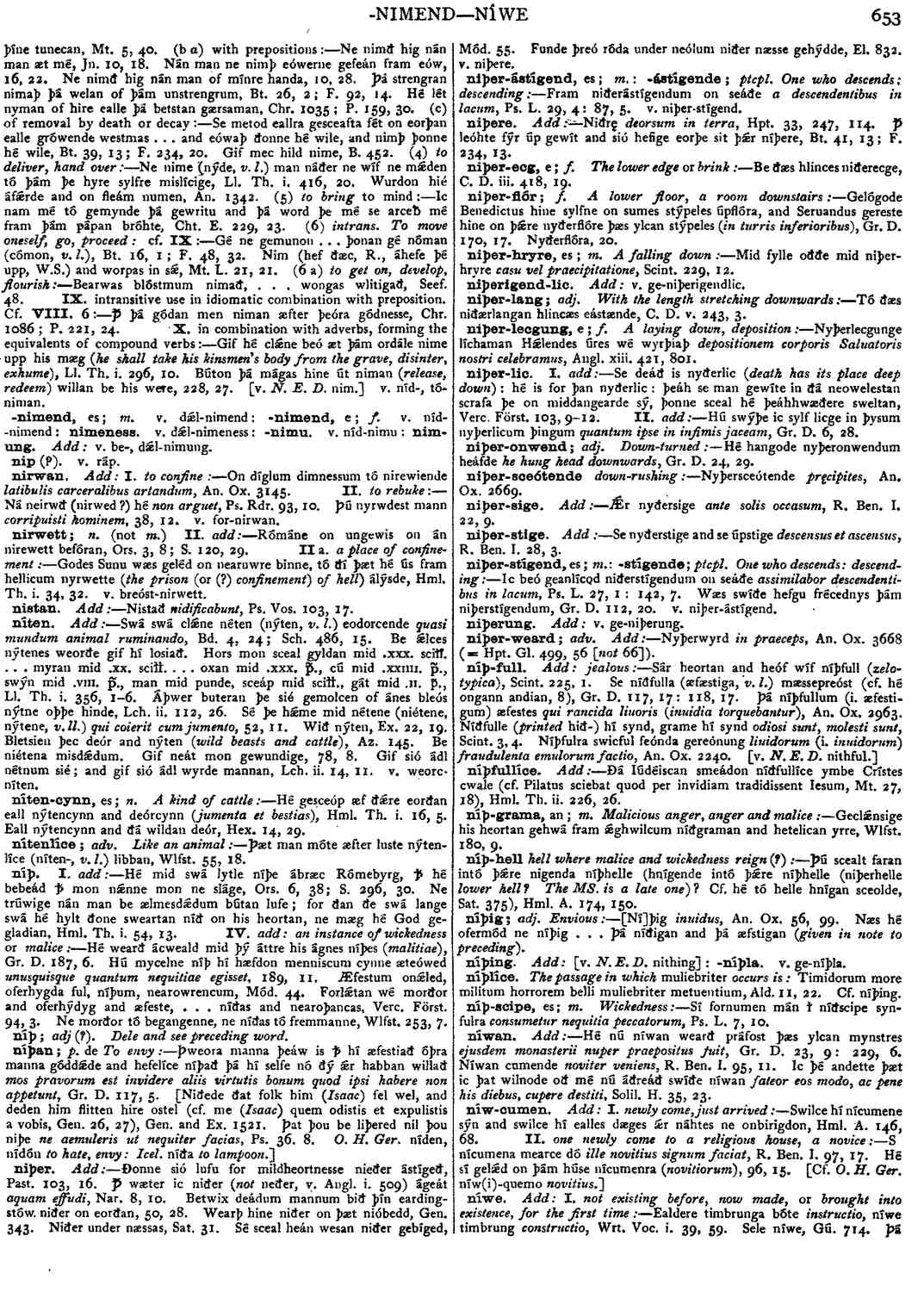níwe
-
Ealdere timbrunga bóte instructio, níwe timbrung
constructio,
- Wrt. Voc. i. 39, 59.
-
Sele níwe,
- Gú. 714.
-
Þá(
at the creation of Adam)
wæs fruma níwe ælda túdres . . . : fæder wæs ácenned Adam ǽrest, 795. -
Adam . . . neorxna wonges níwre gesceafte hyrde,
- Gen. 171.
-
God geswác þá þǽre níwan gesceapennysse
requievit Deus a novarum conditione creaturarum,
- Angl. vii. 4, 22.
-
Gif mon on níwne weall unástíðodne micelne hróf onsett,
- Past. 383, 32.
-
Hé getimbreð eardwíc níwe,
- Ph. 431.
-
Níwe flódas Nóe oferláð,
- Exod. 362.
-
Hié níwa ceastra timbredon, Ors. 1. 10; S. 48, 9. I a.
of a kind now first invented or introduced :-- Níwe nihtweard (the pillar of fire )
sceolde wícian ofer weredum,- Exod. 116.
-
Swég úp ástág níwe,
- B. 783.
-
Þás níwan spel ic þé ealle in cartan áwríte,
- Nar. 3, 17.
-
Wæs him níwe gefeá befolen in fyrhðe,
- El. 195.
-
Longe neótan níwra gefeána,
- Gú. 805.
-
Ne byð god on þé níwe geméted, ne þú fremedne God gebiddest,
- Ps. Th. 80, 9.
-
Hí offrodon . . . þám godum þe hí ne cúðon; níwe cómun þe hira fæderas ne wurðodon,
- Deut. 32, 17.
-
On þǽm æfterran gére gelǽrdan Rómána biscepas swelce níwe rǽdas swelce hié fol oft ǽr ealde gedydan, Ors. 4, 7; S. 184, 2. III a.
restored after demolition, decay, disappearance, &c.
:-- Feorh bið níwe, þonne hé his líc, þæt ǽr líg fornóm, somnað,- Ph. 266.
-
Þá ealdan forþ gewitun, and efne hí wǽrun gewordene níwe,
- An. Ox. 40, 36.
- ¶ applied to the moon :-- Gyf se móna byð ǽr ǽfenne fram ðǽre sunnan geedníwod, hé byð þonne sóna æfter sunnan setlgange níwe geteald, Lch. iii. 266, 4.
-
Wé cweðað níwne mónan æfter menniscum gewunan, ac hé is ǽfre se ylca þeáh ðe his leóht gelómlíce hwyrfe,
- 242, 15.
-
Ꝥ geár hæfð twelf níwe monan,
- 248, 25.
- Bið ús geset níwe nama; swá swá se wítega cwæð, 'God gecígð his ðeówan óðrum naman.' Eft se ylca wítega cwæð,' Þú bist gecíged níwum naman,' Hml. Th. i. 96, 27-29.
-
Áfeormudre þæs ealdan lífes yfelnesse on níwre geleáfan gyfe wé gangað,
- An. Ox. 40, 25.
-
Bibod niówe (níua,
- L. ) ic sello iów, Jn. R. 13, 34. IV a. of
-
Ðǽre níua (neówe, R. ) gewitnesse
noui testamenti,
- Mt. L. 26, 28.
-
Nalæs ꝥ an ꝥ hé gýmenne dyde þǽre níwan cyricean þe of Angelcynne gesomnad wæs, ac swylce eác þára yldra bígengena Brytta and Scotta,
- Bd. 2, 4 ; Sch. 127, 12.
-
Se godspellere wæs fæstnung ǽgþer ge þǽre ealdan ǽ ge þǽre níwan,
- Bl. H. 163, 25.
-
Hé hié mid þǽm ilcan wrence beswác þe hé æt heora ǽrran gemétingge dyde, and eác mid þǽm níwan þe hié ǽr ne cúðon,
- Ors. 4, 9 ; S. 188, 33.
-
Cóm Hasterbal se níwa cyning,
- Ors. 4, 6 ; S. 176, 33.
-
Þá Scipia hæfde gefaren tó ðǽre níwan byrig Cartaina,
- 4, 10; S. 196, 33.
-
Níwes
recentis (paradisi),
- An. Ox. 688.
-
Ic tiohhie þæt hió þæs níwan taman náuht ne gehicgge,
- Met. 13, 26.
-
Heó forgit sóna hire níwan taman,
- Bt. 25; F. 88, 12.
-
Níwe sibbe,
- B. 949.
-
Caelf niówe vitulum novellum, Ps. Srt. 68, 32. VI a. of articles of food or drink,
freshly made, produced, or grown, belonging to the fresh crop or growth
:-- Mid neówum ele gemencged,- Lch. i. 350, 2.
-
Gé etað ealde mettas oð eów níwe cumon, Lev. 26, 10. VI b.
recently made, not yet used or worn, still unimpaired by use
:-- Heó wæsceð his wárig hrægl, and him syleð wǽde níwe,- Gn. Ex. 99.
-
Hé forð bringð of his goldhorde níwe þing and ealde,
- Mt. 13, 52.
-
Níwe heofonlic
neotericus uranii, celestis nouus,
- Hpt. 31, 13, 303.
-
Ne aron gié gestas and níwe cumo (advenę), Rtl. 82, 30. VII a. new to a thing, inexperienced in :-- Níwe on geleáfan
neophitus,
- Hpt. 31, 13, 304.
-
Eall þás þing þǽre níwan þeóde Ongelcynne on Godes geleáfan gedafenað cúð habban quae omnia rudi Anglorum genti oportet haberi comperta, Bd. 1. 27; Sch. 76, 21. VII b. inexperienced, unskilled, rude :-- Níwum gebúrum
rudibus colonis.
- An. Ox. 11, 88.
-
Wénst þú ꝥ hit hwæt níwes sié,
- Bt. 7, 2 ; F. 16, 27.
-
Hwæthwegu níwes and seldcúþes,
- 34, 4 ; F. 138, 29.
-
Gelamp þé áht (ǽnig þing
v. l. )
níwes ?,- Gr. D. 4, 2.
-
Hwæt ic yrmða gebád . . . níwes oððe ealdes,
- Kl. 4.
Bosworth, Joseph. “níwe.” In An Anglo-Saxon Dictionary Online, edited by Thomas Northcote Toller, Christ Sean, and Ondřej Tichy. Prague: Faculty of Arts, Charles University, 2014. https://bosworthtoller.com/55996.
Checked: 0